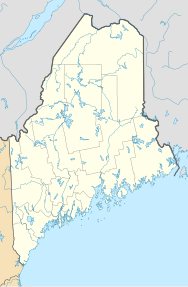Blue Hill, Maine
| Blue Hill, Maine | |
|---|---|
| Town | |

Blue Hill from Parker Point
|
|
| Location within the state of Maine | |
| Coordinates: 44°24′44″N 68°34′25″W / 44.41222°N 68.57361°W | |
| Country | United States |
| State | Maine |
| County | Hancock |
| Incorporated | 1789 |
| Area | |
| • Total | 86.57 sq mi (224.22 km2) |
| • Land | 62.48 sq mi (161.82 km2) |
| • Water | 24.09 sq mi (62.39 km2) |
| Elevation | 46 ft (14 m) |
| Population (2010) | |
| • Total | 2,686 |
| • Estimate (2012) | 2,676 |
| • Density | 43.0/sq mi (16.6/km2) |
| Time zone | Eastern (EST) (UTC-5) |
| • Summer (DST) | EDT (UTC-4) |
| ZIP code | 04614 |
| Area code(s) | 207 |
| FIPS code | 23-05700 |
| GNIS feature ID | 0582357 |
| Website | Town of Blue Hill, Maine |
Blue Hill is a town in Hancock County, Maine, United States. The population was 2,686 at the 2010 census. It is home to the Blue Hill Public Library, Blue Hill Memorial Hospital, George Stevens Academy, the Blue Hill Harbor School, New Surry Theatre, Kneisel Hall, Bagaduce Music Lending Library, the Kollegewidgwok Yacht Club, the Marine & Environmental Research Institute, and the Blue Hill Country Club. A community on Blue Hill Bay, the town is the site of the annual Blue Hill Fair.
It was one of six townships granted by the Massachusetts General Court to David Marsh and 351 others for their service in the French and Indian War. Called Plantation Number 5, it was first settled in 1762 by Captain Joseph Wood and John Roundy from Andover, Massachusetts, who built homes on Mill Island at the tidal falls. It would then be called Newport Plantation. On January 30, 1789, the town was incorporated as Blue Hill, named after its commanding summit overlooking the region.
The outlets of various ponds provided water power for several sawmills and gristmills. By 1859, 5,000 cords of firewood were sent from the port annually. Other products included lumber, masts and roof shingles, but the predominant industry was shipbuilding. Beginning in 1792, 133 vessels were constructed at Blue Hill, some of them brigs and ships, but most schooners. The town was also noted for the quality of its granite, some of which was used to build the Brooklyn Bridge, building, and the U.S. Custom House at Norfolk, Virginia. In 1876, local quarries employed 300 workers.
Blue Hill c. 1920
Main Street c. 1909
The Elms c. 1920
According to the United States Census Bureau, the town has a total area of 86.57 square miles (224.22 km2), of which 62.48 square miles (161.82 km2) is land and 24.09 square miles (62.39 km2) is water. Located on Blue Hill Bay, the town is drained by Mill Brook. Blue Hill, elevation 940 feet (287 meters), is the town's highest point. Long Island, situated in Blue Hill Bay, is part of the town.
...
Wikipedia

